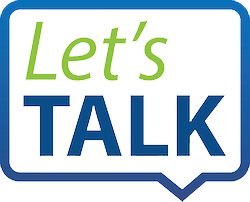
A healthy relationship consists of 5 important elements
 Open, honest, and safe communication is a fundamental part of a healthy relationship. That means you both have to be able to talk to each other openly and honestly. Whether your relationship is casual, serious, or even a friendship, it’s important to feel respected, safe, and heard.
Open, honest, and safe communication is a fundamental part of a healthy relationship. That means you both have to be able to talk to each other openly and honestly. Whether your relationship is casual, serious, or even a friendship, it’s important to feel respected, safe, and heard.
Communication is a huge part of all relationships. Being able to express how you feel and taking time to listen to the other person is important and essential.
In a healthy relationship, you should be able to:
- SPEAK UP. If something is bothering you, you should be able to speak up if something is bothering you.
- FEEL RESPECTED. Respecting one another is important in a healthy relationship. You should feel that your ideas, feelings, and needs are also being considered.
- COMPROMISE EQUALLY. Each person should be willing to compromise and listen to the other person’s thoughts and needs. Disagreements happen, but you should be able to communicate respectfully and then come up with a solution in a fair and rational way that works for the both of you.
- FEEL SUPPORTED. You should be able to rely on your partner, which in turn helps you feel safe and secure in the relationship. You should feel comfortable to let your partner know when you need their support. Healthy relationships are about building each other up, not putting each other down.
- FEEL LIKE YOUR PRIVACY IS RESPECTED. Each person has a right to decide what they are OK with in a relationship. Just because you’re in a relationship doesn’t mean you have to share everything and constantly be together. This includes physical matters, how often you talk to your partner, and whether you share your passwords. If you don’t like when your partner texts and calls too much or doesn’t give you alone time, you have the right to speak up.
 Fairness and equality are fundamental parts of a thriving, healthy relationship. A heathy relationship. shouldn’t be one-sided. Each person should be willing to compromise and listen to the other person’s thoughts and needs. The opinions of both partners matter and deserve respect.
Fairness and equality are fundamental parts of a thriving, healthy relationship. A heathy relationship. shouldn’t be one-sided. Each person should be willing to compromise and listen to the other person’s thoughts and needs. The opinions of both partners matter and deserve respect.
Why does equality matter? Well, we know that in an abusive relationship, one partner maintains power and control over the other. This type of relationship is extremely unbalanced and unequal. By understanding equality in a relationship, we can evaluate and ensure healthier relationships for ourselves.
For a relationship to work, both partners must give equal effort. Nourishing a committed, successful relationship is a two-person endeavor. One-way relationships don’t work.
Both partners should encourage each other’s dreams and goals.
If you feel like things are too one-sided (one person is always in control, one person gets all the attention, one person gets their needs met), then this is plainly unfair and a form of inequality.
If you unclear as to whether your relationship is fair and equal, feel free to contact your Safe Journey teen counselor advocate at 814-438-2675 or email info@safedatesmatter.org.
 Each person has a right to decide what they are OK with in a relationship. This includes physical boundaries, like how often you talk to your partner; emotional boundaries, like saying “I love you” when you are ready; and digital boundaries, like whether you share your social media passwords. If you don’t like when your partner texts and calls too much or doesn’t give you alone time, you have the right to speak up!
Each person has a right to decide what they are OK with in a relationship. This includes physical boundaries, like how often you talk to your partner; emotional boundaries, like saying “I love you” when you are ready; and digital boundaries, like whether you share your social media passwords. If you don’t like when your partner texts and calls too much or doesn’t give you alone time, you have the right to speak up!
Everyone likes their space, but sometimes setting boundaries to keep that space can be hard. Whether you just started dating or have been going out for a while, setting boundaries is an important part of any relationship. To have the healthiest relationship, both partners should know each other’s wants, goals, fears, and boundaries. Healthy boundaries in a relationship don’t come naturally, nor do they come easily. You should feel comfortable honestly communicating your needs to your partner without being afraid of what they might do in response. If your partner tells you that your needs are stupid, gets angry with you, or goes against what you’re comfortable with, then your partner is not showing you the respect you deserve. If you want to know more about healthy, unhealthy, and abusive relationships, feel free to contact your Safe Journey teen counselor advocate at (814) 438-2675 or email info@safedatesmatter.org
Physical Boundaries
In a healthy relationship, both partners treat each other with respect and are able to communicate open and honestly without the fear of being hurt physically. Both partners know how far each other wants to go, and they communicate with each other if something changes. Whether it comes to holding hands, kissing, touching, or “getting physical,” don’t rush. You should be able to take things at your own pace. You should not feel like you owe your partner anything. It isn’t fair for your partner to claim that you don’t care about them because you won’t do something you are not comfortable with or even want.
Digital Boundaries
Together, you can decide what feels healthy and what doesn’t for each of you. Both of you will need to communicate, and there may be some negotiating and compromising as you figure out an agreement that works for both of you. But if your partner asks you to do something that doesn’t feel right, or they try to control you in some way, that’s when you get to say that this isn’t healthy for you. Even if you trust your partner, sharing passwords for your phone and website accounts isn’t always the best idea. Just like you should be able to spend time by yourself, you should have your own digital privacy. Your partner should trust and respect you enough to allow you privacy. Giving your partner access to your Facebook or Instagram accounts allows them to post anything they want without getting your permission first. Just to be safe, your passwords should be something that only you know so you always have control of your information. It’s important to have digital boundaries about what you’re comfortable sending digitally. Once you’ve hit send on a photo or text, you lose control over who sees it. If your partner sexts you and demands that you sext back, you should be able to tell them you aren’t comfortable doing that, and they shouldn’t get angry or threaten you.
Emotional Boundaries
In many young relationships, couples typically want to spend a lot of time with each other. Remember that it’s important to have some time away from each other, too. Both you and your partner should be free to hang out with friends (of any gender) or family without feeling guilty. It’s also healthy to spend time by yourself doing things that you enjoy. You should be able to tell your partner when you need to do things on your own instead of feeling trapped into spending all of your time together. If your partner says “I love you” and you don’t feel that way yet, don’t feel bad.
 Having a healthy relationship means giving each other the space and freedom to live your individual lives. Being able to rely on your partner helps you feel safe and secure in the relationship. It’s about knowing someone has your back and best intentions at heart. You expect your partner to be honest.
Having a healthy relationship means giving each other the space and freedom to live your individual lives. Being able to rely on your partner helps you feel safe and secure in the relationship. It’s about knowing someone has your back and best intentions at heart. You expect your partner to be honest.
Before you got together, you and your partner had your own hobbies/sports/activities. You should support and encourage each other in the activities you like to do. It’s nice to spend a lot of time together, but you both should be able to trust each other and not need to be with each other or know each other’s whereabouts all the time. Lack of trust and support is a sign of an unhealthy or abusive relationship. If you are being accused of cheating, when it isn’t warranted, then it could be an unhealthy relationship. If you want to know more about healthy, unhealthy, and abusive relationships feel free to contact your Safe Journey teen counselor advocate at 814-438-2675 or email info@safedatesmatter.org
 Relationships are fun. They also require effort from both people. It’s important to feel respected, safe, and heard. Having a healthy relationship means giving each other the space and freedom to live your individual lives.
Relationships are fun. They also require effort from both people. It’s important to feel respected, safe, and heard. Having a healthy relationship means giving each other the space and freedom to live your individual lives.
Before you got together, you and your partner had your own hobbies, likes, and friends. That shouldn’t change after you get together. Keep doing things that make you happy, and give your partner the freedom to do the same. It’s nice to spend a lot of time together, but be sure to have time away to focus on you, too. Restricting freedom is a sign of an unhealthy or abusive relationship. If you want to know more about healthy, unhealthy, and abusive relationships, feel free to contact your Safe Journey teen counselor advocate at 814-438-2675 or email info@safedatesmatter.org



